|
|
|
Sort Order |
|
|
|
Items / Page
|
|
|
|
|
|
|
| Srl | Item |
| 1 |
ID:
087664
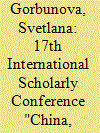

|
|
|
|
|
| Publication |
2009.
|
| Summary/Abstract |
The main subject of the 17th International scholarly conference "China, Chinese civilization and the World. Past, Present, and Future", which was held in Moscow on October 22 to 24, 2008, at the Institute for Far Eastern Studies, was "Thirty years of Reforms in the PRC, Experience, Problems, Lessons".
The conference was attended by about 150 Russian and foreign scholars, more than half of whom presented reports and read papers. Among the participants from abroad were scholars from Sweden, Germany, the United States, Vietnam (a delegation of the Vietnamese Academy of Social Sciences) and, of course, China, who represented various scholarly centers (the Academy of Social Sciences of the Yunnan and Jilin provinces, the Institute of Contemporary History and the Institute of Modern China of the Academy of Social Sciences of the PRC, the Institute of International Relations of Beijing University, the Beijing Pedagogical University, the Beijing Administrative Institute, the Institute of Party History at the CC CPC, the Nankai University, the Research Institute of Macroeconomics at the PRC State Commission of Development and Reform), as well as several public organizations, for instance, the Chinese Friendship Society with Foreign Countries, and the Shanghai Association of Social Sciences. Russian scholars of Chinese studies from Moscow, St. Petersburg, Saratov, Tomsk, Chita, Blagoveshchensk, Vladivostok and Novosibirsk, and also representatives of government and business circles of the Russian Federation and journalists took part in the conference
|
|
|
|
|
|
|
|
|
|
|
|
|
|
|
|
| 2 |
ID:
087663


|
|
|
|
|
| Publication |
2009.
|
| Summary/Abstract |
Statistical and geographical data concerning pirates' attacks in recent years are cited, their actions, as well as measures taken by coastal states to thwart them are described.
The upsurge of the pirates' activity at the coast of Somalia, whose peak was the seizure of the Ukrainian vessel "Faina" with the load of tanks, guns, explosives and ammunition, drew much attention of the world community. Meanwhile, piracy in the Gulf of Aden is only part of this worldwide calamity. According to official data, several hundred piratical attacks take place in various parts of the world annually,1 and their number grows steadily.
A certain regular features can be observed:
1. Piratical attacks have been concentrated in one region of Southeast Asia, in the seas washing Malaysia, Indonesia, Vietnam, South China, Singapore, Thailand, Cambodia, and the Philippines.
2. The tonnage of sea-going vessels constantly grows, this is why each seizure and plundering of a ship brings greater harm to ship-owners, cargo-carriers, and insurance companies.
3. The character of piracy has changed: previously the pirates took everything valuable on board what could be carried away, leaving the ship and crew intact, whereas now ships with crews seem to vanish into thin air.
4. The attempts to arm the crew or to place special guards on board often end badly. Well-informed and armed-to-the-teeth gangs attack quite unexpectedly, a fight ensues during which hostages are taken, and pirates offer either to surrender or threaten to shoot the crew and sink the ship. Pirates have become more cruel, well-informed and better equipped technically.
|
|
|
|
|
|
|
|
|
|
|
|
|
|
|
|
| 3 |
ID:
087643


|
|
|
|
|
| Publication |
2009.
|
| Summary/Abstract |
"China values highly the trend of bilateral development in Chinese-Indian relations ... they are now in the best period of their development."1
"In 2007, India recorded 140 incursions on its disputed border regions.... This is their style ... it is their means of pressuring India."2
These two quotes were separated in time by just two weeks. The first was from an announcement by the PRC foreign minister on June 5, 2008. The second was from a speech by India's defense minister, made a bit later.
The synchronicity of these two seemingly opposite statements from Beijing and Delhi, while officials in both capitals justifiably give positive marks to the current stage of bilateral relations on the one hand and continue to resort to extremely harsh rhetoric on the other, is quite common today. The paradox here is only superficial, however, for in it lies perhaps the quintessence of the present stage of Chinese-Indian relations, in which indubitable progress is accompanied by difficulties and complicated unresolved issues.
|
|
|
|
|
|
|
|
|
|
|
|
|
|
|
|
| 4 |
ID:
087648
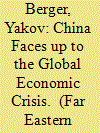

|
|
|
|
|
| Publication |
2009.
|
| Summary/Abstract |
China's growing involvement in the global economy and politics brings it considerable benefits. China gets unrestricted access to world markets for goods and services to supply to, to natural resources and fuels, new technologies and modern managerial know-how, and to international organizations that adopt decisions critical to China's development. All these benefits are acquired at the cost of the country's rising dependence on worldwide developments, market ups and downs, and even worldwide cataclysms.1 The current global financial and economic crisis shows this beyond a shadow of doubt. Accordingly, debates are erupting now and then in China about the balance of gain and loss; about the best way to use the advantages of being involved in globalization and to avoid its most destructive consequences; and also about what is needed to maintain the country's economic and political sovereignty and security without fencing itself off from the rest of the world, but instead take the position of a responsible participant and agent of world history.
Crises in the free-market economy that China is determined to build are certainly unavoidable. The key issue is then to realize that the market, the principal advantages of which are higher competitiveness of enterprises, the state itself, and individuals, cannot correct its inevitable deficiencies all by itself. While promoting a free-market economy, therefore, China is seeking to keep very power-
|
|
|
|
|
|
|
|
|
|
|
|
|
|
|
|
| 5 |
ID:
082853


|
|
|
|
|
| Publication |
2008.
|
| Summary/Abstract |
Power production is one of the basic branches of the world economy, and its internationalization has led to many factors of energy security becoming an important factor which influences the entire system of modern international relations. ... After the first energy crisis of the mid-1970s and its repetitions in the early 1980s and 1990s it became evident that the energy factor had begun to play a no less crucial role in international relations than the military one, as well as other traditional factors of influence
|
|
|
|
|
|
|
|
|
|
|
|
|
|
|
|
| 6 |
ID:
087655


|
|
|
|
|
| Publication |
2009.
|
| Summary/Abstract |
In September 2008, Russian President Dmitry Medvedev summed up his trip to the regions of the Far Eastern Federal Okrug (Territory) as follows: "There is a stark contrast between the region's natural beauty and its squalor. It has unique potential in terms of natural resource development, but this is hampered by a depressed, plodding, and extremely underdeveloped economic system."
The Far Eastern Federal Okrug is the largest in Russia. It occupies more than 36% of the country's territory, but accommodates less than 5% of the country's population. It is a region with extremely rich supplies of lumber and natural resources and with a unique flora and fauna. The Sakhalin shelves are rich in oil and gas, while the sea abounds in fish.
Its geopolitical position compels the government to regard the Far East not only as a territory that supplies diverse natural resources, but also as Russia's strategic springboard in the Pacific Basin, which offers favorable living conditions.
Alas, the size of the population in the Far East and Siberia, just as our country's population as a whole, has been declining for more than 15 years now. The demographic situation remains one of the most acute problems in these regions. At the beginning of 2008, approximately 6.5 million people lived in the Far East.
|
|
|
|
|
|
|
|
|
|
|
|
|
|
|
|
| 7 |
ID:
087660


|
|
|
|
|
| Publication |
2009.
|
| Summary/Abstract |
The rout of Japan and the liberation of Korea by the Allied Forces, which ended in the unconditional surrender of the Japanese army on August 15, 1945, opened a new epoch in the political history of Korea. The long-awaited collapse of the Japanese colonial power was received by the Korean public as the beginning of a new stage in the country's history1 and an opportunity to create a new independent society on the basis of an anti-imperialist, anti-feudal foundation.2 Thus, the national task as it was understood by the public forces did not fully correspond to the drafts of the solution of the Korean problem on the principle of international trusteeship as suggested at international conferences at the time of World War II. It was only the political situation that could change the position of the leaders of the nationalist and left-wing movements on the question of ending colonization and creating a genuinely independent Korean nation.
Prior to 1948, the Korean nationalists and representatives of left-wing organizations believed that Korea's future could and should be determined by the joint efforts of the political parties of Korea themselves, but not by international conferences and their participants. But there were too many obstacles in the way of the implementation of that strategy, the main ones being the presence of foreign troops on Korean territory.
The liberation of Korea was not a result of the straggle of the Koreans against the Japanese militarists. It was achieved with the help of outside forces which in turn, began to claim administrative power in the occupied zone. The Koreans found themselves in the position of outsiders in deciding the question of power and its legal existence.
Another, no less important, obstacle was the absence of political unity among
|
|
|
|
|
|
|
|
|
|
|
|
|
|
|
|
| 8 |
ID:
087658
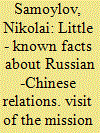

|
|
|
|
|
| Publication |
2009.
|
| Summary/Abstract |
This article uses Chinese and Russian sources to relate the visit of a Chinese diplomatic mission headed by Anson Burlingame, Zhi Gang, and Sun Jiagu to St. Petersburg. It reveals unknown details about this visit showing that the Russian government received the Chinese delegation at the highest level, observing all the rales and standards of diplomatic etiquette of that time. It was in St. Petersburg that the mission leader, American diplomat Burlingame, passed away, requiring his immediate replacement. This first official mission of the Qing Empire to a Western country was a milestone in the development of relations between Russia and China and helped to bring them up to a qualitatively new level by paving the way to establishing China's permanent embassy in Russia.
|
|
|
|
|
|
|
|
|
|
|
|
|
|
|
|
| 9 |
ID:
087646
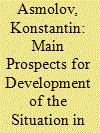

|
|
|
|
|
| Publication |
2009.
|
| Summary/Abstract |
Considering the possible escalation of the confrontation between the United States and an increasingly powerful China, the Korean Peninsula is of extraordinary importance to the Americans as a staging area, and demonized North Korea provides good grounds for an American military and political presence in the region. Recently, however, the lack of a unified US strategy on the North Korean issue has been apparent. This discord stems from the existence of several interest groups, each with its own point of view, in the United States.
To begin with these differences exist between those who, in the words of A. V. Vorontsov, may provisionally be called "pragmatists" and "messianics." The first group, as is clear from its sobriquet, favors a pragmatic approach to resolving the North Korean issue, and it believes that a rapid settlement on American terms would lower the level of possible tension, put an end to the "nuclear domino" trend so undesirable to Washington, and generally aid the growth of US prestige as an objective power capable of being an honest guarantor of international security
|
|
|
|
|
|
|
|
|
|
|
|
|
|
|
|
| 10 |
ID:
087644
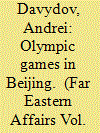

|
|
|
|
|
| Publication |
2009.
|
| Summary/Abstract |
It is generally recognized that the relations between the United States and China today are extremely important. As is known, they are characterized not only by interaction and cooperation, but also an acute rivalry, which resembles an iceberg: only a small part of it is visible, while the real confrontation between the two countries is hidden, not to be seen by the general public.
In August 2008, this hidden American-Chinese confrontation reached its peak and marked a qualitatively new stage in the relations between the two countries. We mean the 29th Olympic Games held in Beijing.
It would seem that the Olympic Games as a purely sports event should demonstrate what country could be regarded the leading sports power of the world for the current four-year period. In actual fact, however, everything is more serious: the modern Olympics have long turned into a yardstick of not only the sport status, but also the international status of one or another state, its position, weight and prestige in the world hierarchy.
In this sense, the Beijing Games were no exception. The victory scored by the Chinese team which won the greatest number of gold medals has not only "legitimized" China's becoming the new sports leader of the world, but also strengthened its position as a leading world power capable to throw a real challenge to the global hegemony of the United States of America.
Let us turn to historical analogy: soon after the brilliant performance of the Soviet team at the Melbourne Olympics in 1956, people began to talk of the
|
|
|
|
|
|
|
|
|
|
|
|
|
|
|
|
| 11 |
ID:
082851


|
|
|
|
|
| Publication |
2008.
|
| Summary/Abstract |
The beginning of the 21st century was distinguished by the yearly expansion and strengthening of collaboration between Russia and China in the world arena. At its heart lies the coincidence or similarity between both countries' approaches to a wide range of international issues, among which the task of creating a new democratic and just world order holds an important position. The consolidating role that Russia and China can play here stems from the essential, deeply pragmatic needs of humanity, which is encountering the modern age with threats that are completely new in terms of both scale and type
|
|
|
|
|
|
|
|
|
|
|
|
|
|
|
|
| 12 |
ID:
082854


|
|
|
|
|
| Publication |
2008.
|
| Summary/Abstract |
As the world economy grows increasingly globalized and business activity centers arise at regional and subregional levels, Russia is faced with the challenge of sorting out its priorities as it prepares to integrate more closely into the world economy. ... For much too long already, Russia's economy has been linked to European countries, and at present the 25 nations of the European Union handle over 52% of this country's foreign trade. ... Against the backdrop of problems besetting Russia's relations with several countries linked with it in the Commonwealth of Independent States (CIS), the prospects for continued integration with its closest neighbors are getting murky.
|
|
|
|
|
|
|
|
|
|
|
|
|
|
|
|
| 13 |
ID:
087652
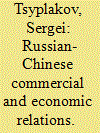

|
|
|
|
|
| Publication |
2009.
|
| Summary/Abstract |
The history of economic relations between the Russian Federation and China breaks down into two periods differing in scale, evolution speed, content of economic exchanges, and mechanisms and their driving forces behind them. The first period began in 1992, that is, at the time when Russia and China entered into direct trade and economic relations, and ends with the close of the 20th century. The second period is running just now.
The first period was highlighted by two opposing trends. In particular, the 1990s were dominated, in political terms, by the development of "Russian-Chinese relations of equal and confidential partnership to achieve strategic cooperation in the 21st century," which laid a constructive groundwork for establishing commercial and economic links
|
|
|
|
|
|
|
|
|
|
|
|
|
|
|
|
| 14 |
ID:
087616


|
|
|
|
|
| Publication |
2009.
|
| Summary/Abstract |
The article examines the main specific features of the relations between Russia and China in the international-political, trade and economic and military spheres in 2008. The results of the public opinion poll in the PRC on the subject "Russia as seen by Chinese" are given. Beijing's reaction to the events in the Caucasus last August and the impact of the world economic crisis on bilateral trade are also analyzed.
Strategic partnership and interaction with China on a broad range of international political, economic and humanitarian problems are among the major achievements of Russian foreign policy. The strategy of Russia's long-term progress and the consolidation of its positions as one of the leading independent centers of world politics require the consistent strengthening and broadening of its multilateral cooperation and interaction with the PRC as one of the main rapidly developing giant countries. The economic growth rates of our country, the rapid development of Siberia and the Far East, the protection of the national security of the Russian Federation and the defence of its global political and economic interests, including those in the vital regions of Central and East Asia will largely depend on Russia's achievements in the Chinese direction. Besides, the latter is an alternative, as it were, to the Euro-Atlantic vector of Russian foreign policy and plays a definite compensatory role, allowing Russia to cope with some difficulties in its relations with the United States and the European Union.
|
|
|
|
|
|
|
|
|
|
|
|
|
|
|
|
| 15 |
ID:
082852


|
|
|
|
|
| Publication |
2008.
|
| Summary/Abstract |
One of the most important foreign policy events of the year 2007 was RF President Vladimir Putin's February speech at the Munich Conference, signifying a unique turning point in Russia's relations with the West. ... The Russian leader's sharp criticism of the United States for its uncontrolled use of force in international affairs, and for its "unilateral, illegal actions" leading to the outbreak of wars and minor conflicts, had such a powerful and wide international response that all other events, dates, and facts that, under different circumstances would really deserve being recalled, were pushed into the background
|
|
|
|
|
|
|
|
|
|
|
|
|
|
|
|
|
|
|
|
|